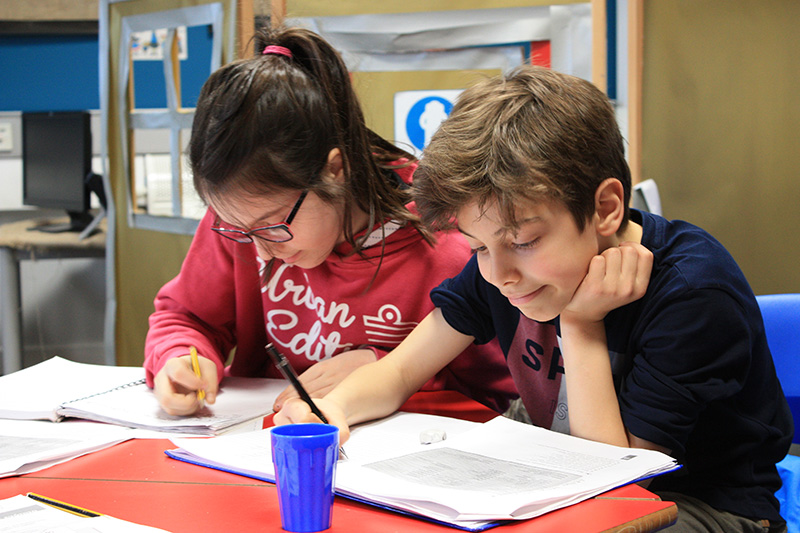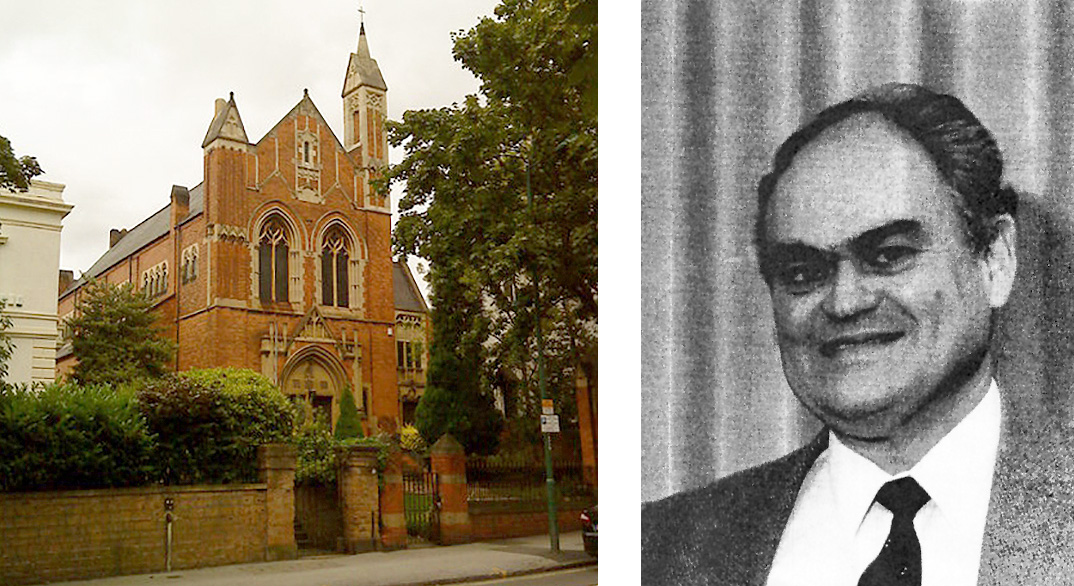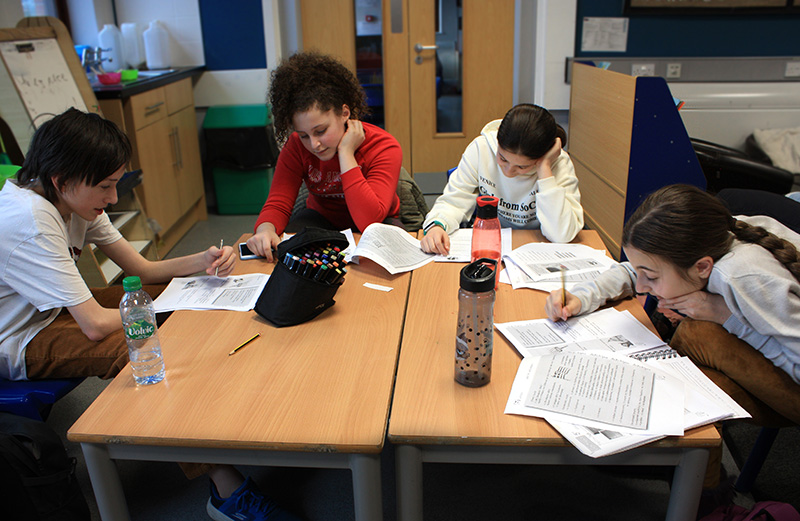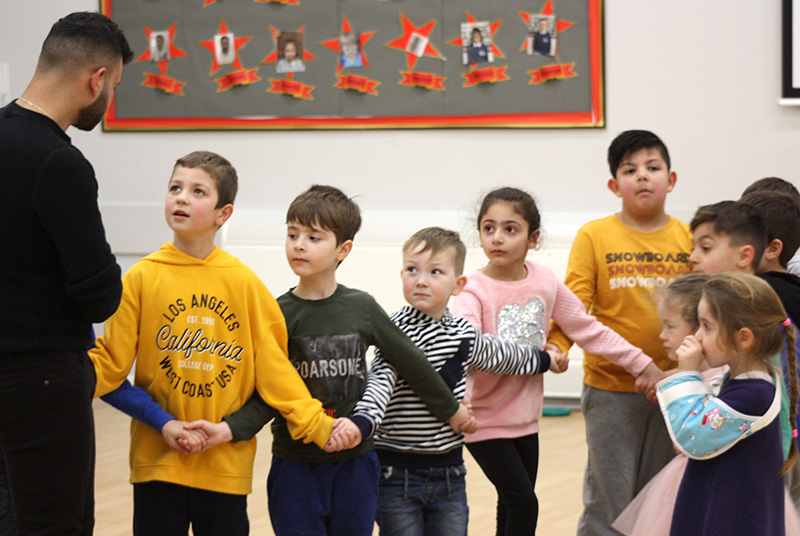Basic Info
The school of the Greek Community of Nottingham, “Virgin Mary Eleousa”, is the official Greek supplementary school of Nottingham recognised by the Ministry of Education of Greece and the Ministry of Education of Cyprus. It accepts school-age children and adults of Greek origin or heritage. It welcomes students with an interest in Greek language and culture from any ethnic background . As its name suggests, the school is an integral part of the Greek Community of Nottingham, which in turn is a member of the Central Educational Council (K.E.S) of the Holy Archdiocese of Thyateira and Great Britain, which is based in London. Chairman of K.E.S is the archbishop of Great Britain.

The School runs three days a week. On Saturdays, all children's classes are held at the Djanogly Sherwood Academy (Sherwood Rise, New Basford, Nottingham, NG7 7AR). Tuesdays and Wednesdays, adult evening classes are held at the community hall, behind the Greek Orthodox church (184 Derby Rd, Nottingham, NG7 1NF).
Brief History
The Greek School of Nottingham was established in 1970 by parents –members of the Greek-Orthodox Community of Nottingham, and took its name after the Greek Orthodox church of Nottingham 'Panagia Eleousa'. For 25 years chairman of the school committee was George Antippa. During his days the school was recognized by the Department of Education of City of Nottingham and started to receive its annual grants (1990). In 1998 was recognized as an official examination Centre by EDEXCEL.

Aims Of The School
According to its constitution the aim of the school is to introduce and reinforce children’s cultural and linguistic identity through the teaching of the Greek language, History and Culture and therefore help them to raise their self-awareness and self-esteem.
More specifically amongst its aims are:
- the teaching of the Greek language and history, as well as the teaching of Greek culture and Christian Orthodox religion
- the maintenance of the Greek identity for the students of Greek origin
- their preparation so that the students participate actively and equally in everyday life and activities as citizens of the United Kingdom

For those who are not of Greek origin but attend our school either because they are interested in Hellenism, or because they are related with individuals of Greek origin, the aim of the school is to bring them closer to Greek culture and traditions through the teaching of Greek language and history.
Classes and Curriculum
The following classes run each year:
- One Reception class (ages 4 to 6 years old)
- Three Primary Classes: Level 1, Level 2, and Level 3
- Three Secondary Classes for those who wish to take GCSE, GCE (AS Level and A Level) examinations.
The School follows the official Syllabus of the Greek and Cypriot Ministries of Education which is provided to all the Greek Schools in the UK by the Greek and Cypriot Educational Missions that are based in London. Course books and other teaching material, are distributed to children free of charge and they come directly from the Greek and Cypriot Ministries of Education. This material is very rich and modern and specifically designed and produced, in order to meet the needs of children of Greek origin who live in the UK. The subjects that are taught are:
- Greek language
- History and Culture
- Religious Matters (by our community's priest)
- Theatre and Greek music

All school activities are connected with the National and Religious days, which are all celebrated at the Community Hall, after the closest Sunday's Holy Liturgy (see annual and daily school schedule). These school presentations are always successful and they are always a nice opportunity for children and adults of the community, to meet each other.
Evaluation and Qualifications Provided
1. Internal evaluation
Each term students sit in evaluation tests which take place in all classes. The grades of the tests, the overall attendance and the participation in the other activities of school during the term, as well as the ethos that students demonstrate in school premises, are all taken into account towards the production of students’ reports, which are delivered to their parents, during specific parents’ evenings, at the end of each term.
Also at the end of each school year a “Title of Progress” is provided to all pupils. In these the completed as well as the next level/class are mentioned.
Moreover in a special ceremony at the end of school year specific awards for the best -- in various subjects and activities – students, are granted. The decisions are made by each class teacher separately.
In the same ceremony the best student of all school is rewarded. Here the decision is made by all the teaching staff of school again on the basis of attendance, participation, progress and ethos.
2. External evaluation
The older students of the school have the opportunity of taking part in national examinations at higher level (such as GCSEs and A Levels), as Modern Greek is included in the UK curriculum as an optional part of the general subject Modern Foreign Languages.
Our school is Examination Centre, officially recognized from Joint Council for Qualifications (JCQ) and conduct examinations under the Examination Board EDEXCEL. Our examination centre number is 28357.
It is well known that the specific qualifications can be used for the entry of students in the British universities in combination with the grades from exams taken in their mainstream school.
Teaching Staff
The teaching staff consists of six(6) teachers. All of them are hired by the Greek School Committee for Saturday sessions only.
Vacancies
As many teachers from Greece enquire about job vacancies and possible employment in our school, we would like to clarify that our school is a community supplementary school which runs Saturdays and a few evenings during the week. This means it is not a mainstream school and does not replace the regular/mainstream daily school. Consequently it is not suitable for permanent work. Employment in our school has the form of part time employment and/or voluntary work.
Management of the School
The school is managed by:
1. The school committee. Its members are elected by the pupils’ parents. Its members are pupils’ parents as well as other members of the Greek Community with an interest in educational matters. Furthermore, the priest of the Greek Orthodox Church of Nottingham is ex officio a member of the school committee. The membership number varies between five and twelve members.
The current school committee, as elected by the parents of our school are:
- Ilias Alexandrakis (chair)
- Ismini Kasinou (vice-chair)
- Sotiris Korossis (treasurer)
- Stella Britzolaki (secretary)
- Anastasios Stavrou (secretary)
2. The secretariat of school committee. It is composed from the Chairman, the Vice-chair, the Secretary and the Treasurer. The above members are elected directly from the school committee members.
Our school conforms to all rules and conditions as set by the Local Authorities and the UK government. We’ve been awarded with the Silver Award of the National Resource Centre Quality Framework scheme. This shows that a supplementary school has all the policies and procedures in place to run safely and effectively.
3. The headteacher. The headteacher is employed and appointed by the school committee.
Accreditations
Our school is a member of the Central Educational Council of the Archdiocese of Great Britain.
It is also recognized by the Greek Ministry of Education, Religious Affairs and Lifelong Learning (YPEPTH), and by the Ministry of Education of Cyprus which provides us with books and one teacher.
Finally, it is recognised by the City of Nottingham Supplementary Schools Education Department. The school is inspected by the appropriate department of Nottingham Council every year, to ensure it fulfils the specifications set by the City Council. Inspection reports have always been excellent.

 English
English  Ελληνικά
Ελληνικά